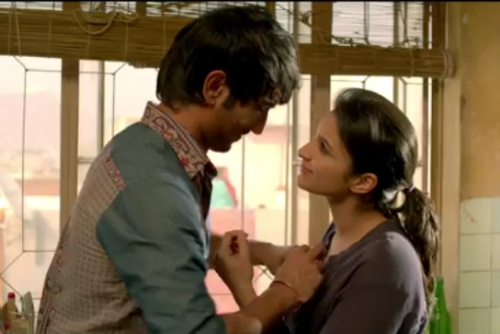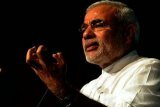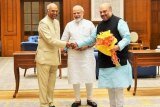Film review: Shuddh Desi Romance

Barring, of course, Goyal (Rishi Kapoor) the caterer and decorator whose business is clearly in jeopardy if this line of thinking flourishes.
Goyal is also the only older character of any consequence and blunted in his protestations about a generation that spends much of its time running ––“Tum log bhagte bahut ho,” he ruefully observes. “Pehle ek doosre ke peeche bhagte ho, phir ek doosre se dur bhagte ho. Ab bhagte hi rahoge ya kabhi thehroge bhi?”
It’s not as if these restive young people are averse to love. On the contrary, with the lowering of societal barriers they’re free to seek romance without the compulsion that it culminates in marriage (love, romance and sex are now interchangeable concepts). Rather than providing a sense of security, domesticity in the traditional sense is a source of fear and anxiety.
More like this
Interestingly, the families of all three principals are conspicuous by their absence. Raghu (Sushant Singh Rajput) has no parents, Gayatri's (Parineeti Chopra) are far away in Guwahati while she lives by herself or with whoever's her current boyfriend in Jaipur––the setting lends colour to the narrative––and Tara’s (newcomer Vaani Kapoor) have no say in her life. At one point when her uncle (Rajesh Sharma) tries to intervene on her behalf out of indignation about family honour etc, she firmly puts him in place and assures him that she can manage her own affairs.
In an earlier version of these feisty heroines, Shruti Kakkar of Sharma’s debut film Band Baaja Baaraat had supportive parents who were proud of their daughter's achievements and wise enough to let her take her own decisions. Here, although the screenplay gets a little dull and repetitive in the second half, mercifully the girls don't do schizophrenic flip-flops to turn coy and conformist as Hindi films routinely force them to (think last year's Ishaqzaade and Cocktail among others).
How often have you heard this line, “Shaadi koi gudda-guddi ka khel nahin hai”? But that’s exactly how these characters see it. Both Raghu and Gayatri are hustlers who work as freelance baraatis; meaning Goyal pays them to participate in random weddings as friends or relatives of either party. One didn’t know such a profession exists, but these days anything is possible. Moreover, it seems like a metaphor for the great Indian wedding sham which reduces marriage to a trade-off between families (the other rented baraatis keep asking for the goodies they've been promised at various weddings) and its glorification in post-liberalisation cinema.
Raghu is smitten by Gayatri at first sight but doesn't know what to do about it, because he's on way to his own arranged marriage with Tara. One thing leads to another and soon he has moved in with Gayatri under the noses of disapproving neighbourhood watchdogs happy to provide him with juicy details of Gayatri's past.
She's wary of his smooth-talking ways having witnessed his capriciousness only recently and afraid to get hurt one more time. But you can't escape the crackling chemistry (Chopra clearly more luminous than her partner) as they play house. He offers to cook for her, she sends him off to buy cigarettes, they dance and make merry. Meanwhile Goyal waits for the inevitable plunge and it happens, just before we go into a toilet break...
Shuddh Desi Romance catches the pulse of modern Indian very well thanks to perceptive (and witty) writing by Jaideep Sahni -- his dialogues are easily the best I've heard at the movies this year. Yet you're left wondering how these free agents cope with the emotional stress of rejection and the uncertainty of rootlessness. Do they think about the future at all, or is drifting the essence? All topics outside the purview of Yashraj's sunny environs.
Unlike, for instance, Meenal Baghel's book Death In Mumbai about the Neeraj Grover murder case which examines the dangerous trajectories of the young and the restless in big cities. When she travels to Kanpur and Mysore (the hometowns of Grover and Maria Susairaj respectively) she realises that their families are blissfully unaware of their activities and are shocked to learn about their hedonistic ways.
But I'm not complaining. Anything that opens the floodgates and liberates Hindi cinema from the shackles of regressive conformity allowing its heroines to breath freely is a step in the right direction.
Deepa Deosthalee is a film critic and a regular contributor to Cinemascope column. The views and opinions expressed in this article are those of the author and does not reflect the views of IndiaNewsBulletin.com. More of Deepa's work can be found on her site Film Impressions.
Most read
- 2017: Full list of Indian States, capitals and their Chief Ministers; Nitish Kumar quits and takes oath again as Bihar CM!
- List of all the major rivers of India: Names, Origin and Length
- Ram Nath Kovind is 14th Indian President after Pranab Mukherjee. Here's a list of all Indian Presidents since 1950
- Indian cabinet September 2017: Full list of Ministers and their portfolios in Narendra Modi government
- Dosa recipe: How to make crispy Paper Dosa and Masala Dosa
- SIIMA 2016 Pics: South Indian Cinema stars dazzle in Singapore for the awards red carpet
- Bollywood Dream Team 2016: Katrina, Alia, Sidharth, Varun, Parineeti, Aditya Roy Kapur US tour in August
- South Indian actress Trisha Krishnan’s father passes away
- Recipe: Misal Pav – how to make missal masala, usal and tarri
- Navrangi Navratri 2016: UK Indians revel in the traditional magic of garba and dandiya in London
India News Bulletin by email
More Lead Stories
- Pics: Salman Khan in London for his Global Diversity Award
- Osterley Gymkhana London hosts 70th Indian Independence Day Celebrations
- Indian tourists involved in fatal collision on M1 motorway involving minibus and 2 lorries
- 2017: Full list of Indian States, capitals and their Chief Ministers; Nitish Kumar quits and takes oath again as Bihar CM!
- Indian train meals not protected from rats, cockroaches, dust, insects, warn auditors












